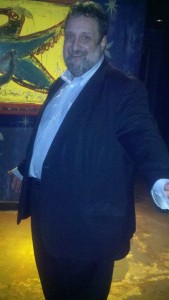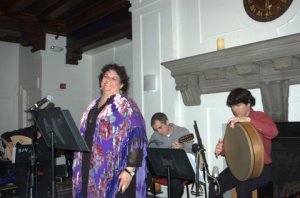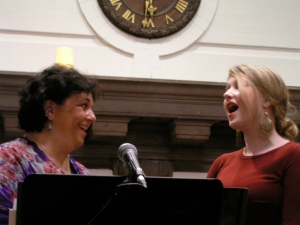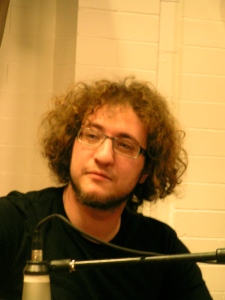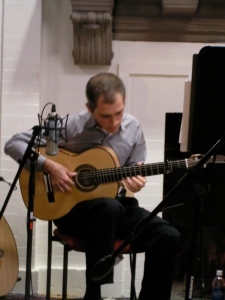 Last winter, New York’s Metropolitan Opera announced a 2014-15 season that would include its first production of a John Adams’ 1991 work, The Death of Klinghoffer. The opera portrays the October, 1985 hijacking of a cruise ship, the Achille Lauro, by members of the Palestine Liberation Front who were seeking the release of 50 Palestinians held in Israeli prisons. A vacationing American Jew, the wheelchair-bound Leon Klinghoffer, was shot by the hijackers. His body was thrown overboard.
Last winter, New York’s Metropolitan Opera announced a 2014-15 season that would include its first production of a John Adams’ 1991 work, The Death of Klinghoffer. The opera portrays the October, 1985 hijacking of a cruise ship, the Achille Lauro, by members of the Palestine Liberation Front who were seeking the release of 50 Palestinians held in Israeli prisons. A vacationing American Jew, the wheelchair-bound Leon Klinghoffer, was shot by the hijackers. His body was thrown overboard.
Controversy and protests began almost immediately after the season announcement. The opera’s libretto, by Alice Goodman, is the source of much complaint and has been cherry-picked for lines deemed offensive and anti-Semitic. Goodman’s text — poetic, often obscure, and perhaps ambivalent in its meaning — begins with alternating choruses that express the feelings of “Exiled Palestinians” and then “Exiled Jews.” Besides the Klinghoffers, the other four named roles are those of the hijackers. (Other characters have generic names, e.g., The Captain.) By identifying the Palestinians and giving them voice, the charges go, Goodman humanizes and elevates them, while placing their politics at center stage. Protesters even objected to the title of the opera, asking why it was called The Death of Klinghoffer and not The Murder of Klinghoffer.
These objections were accompanied by repeated calls for cancellation, as well as for a general boycott of the Met. By spring, General Manager Peter Gelb had acquiesced to at least one demand, calling off a high-definition transmission that would have played in movie theaters around the world. The summer’s Gaza incursion (by Israel) raised the temperature even higher: the protesters were certain that the eight scheduled performances of Klinghoffer would provoke further incidents of anti-Semitism, in addition to those that had been reported in Europe throughout those fraught months.
In late September, opening night of the Met season featured fancy dress inside and demonstrations outside. New York synagogue bulletins urged members to express their displeasure by writing to Mr. Gelb. The New York Times reported that some individuals had gone further, actually finding ways to reach the performers themselves through threatening messages to their managers. On October 20, the night of the production opening, protesters sat in a row of wheelchairs positioned opposite Lincoln Center Plaza.
Art, specifically opera, suddenly mattered. It had become the center of a nasty, noisy, public debate. Some music journalists reveled in the attention and in the moment of relevance for a 400-year-old form. I, however, was incensed by the assault, and embarrassed by the willful ignorance of those who ranted while freely admitting that they had never seen the work in question.
That I love opera is often difficult to explain to those who don’t care for the sound of trained classical singing, let alone those who find it a ridiculous mode of expression. It is improbable, but also compelling and, on the best nights, transporting.
Well-meaning friends, good people who don’t care about opera or opera-going, suddenly wanted my personal take on the argument, a ruling on the allegations of inherent anti-Semitism in Klinghoffer. I was frustrated by their questions and by my inability to respond. Were I to answer, I am sure that I would confound their expectations and might even offend my questioners.
I have been looking forward to seeing Klinghoffer for months now. I’m no fan of Minimalism in music; I actively dislike the monotonous work of Philip Glass. Although I haven’t studied the music in depth, I find that Adams offers greater texture and variety — more to intrigue the ear. A few years ago, his Nixon in China made a deep and lasting impression on me. Why wouldn’t I be curious to hear the next work in the line, an opera that many deem even more successful as music-drama?
Again, my friends don’t care about this. Most aren’t really even concerned with the politics of art, only with the question of possible anti-Semitism which, in this case, is probably closer to insufficient focus on Jewish characters or inadequately expressed sympathy for their point of view.
I am not apolitical in the least, but my politics are my own, my taste in music is my own, and the terms of my Jewish identity are my own, too. I am often inclined to choose art over strict tribal allegiance. Richard Wagner was, by all accounts, a reprehensible man who wrote glorious music. Many other arguably great composers were probable or certain anti-Semites. Of this, there is nothing to be said, no dilemmas or choices to weigh. These were the commonly-held opinions of the day. Over time, the art has outshone and overshadowed the failings of the artists, patrons, and societies.
I doubt that The Death of Klinghoffer is “anti-Semitic,” if such a thing can be said of music itself. It may dramatize conflicting points of view, which is usually desirable in the context of theater. I haven’t seen the opera yet but, once I have, there might be more to say. (Check this space in a few weeks.) For now, I hope to be moved: to me, that is an essential part of watching live performance. I may feel inclined to anger, not because I expect to find the representation to be unfair, but because the acts themselves were cruel and senseless, and because music and drama can heighten emotion. But whatever my response, I will have seen and judged Klinghoffer for its success as a work of lyric theater – my own passion – and not as an affirmation of anyone else’s politics.
Rachel Yurman ©2014
New Cambridge Observer is a publication of the Harris Communications Group, based in Cambridge, MA.


